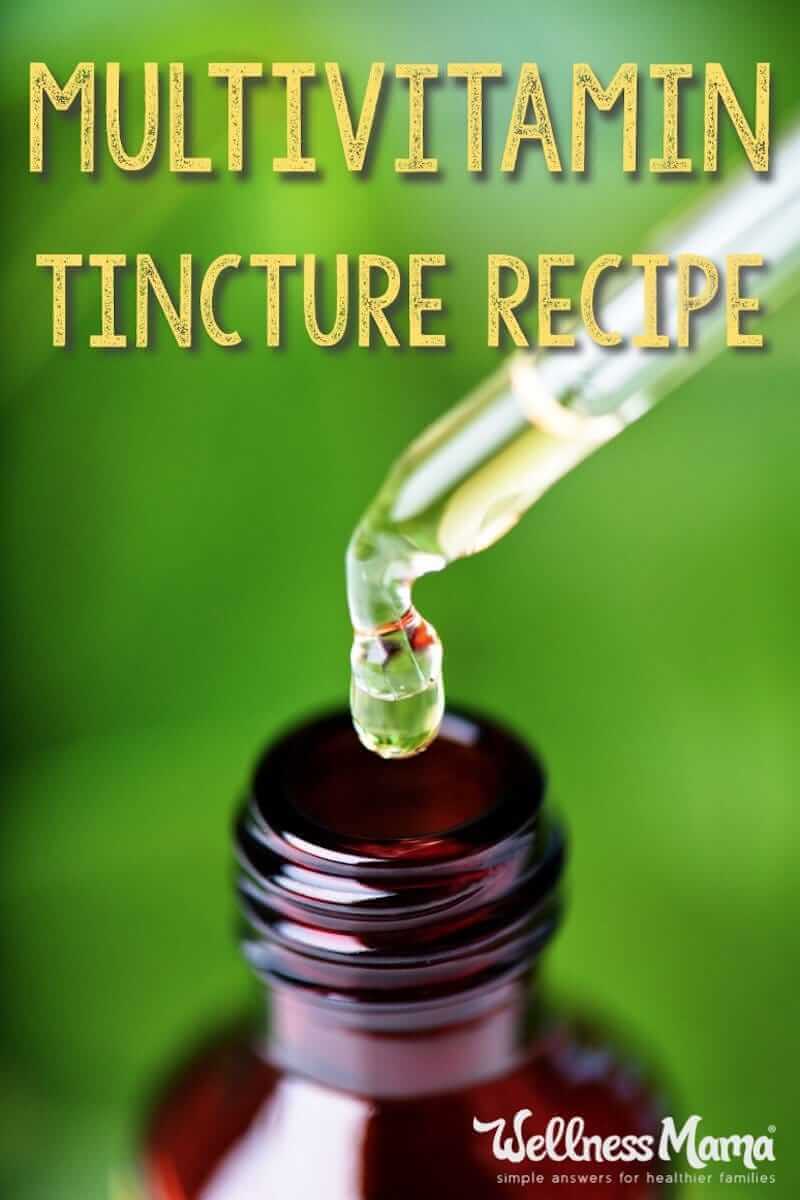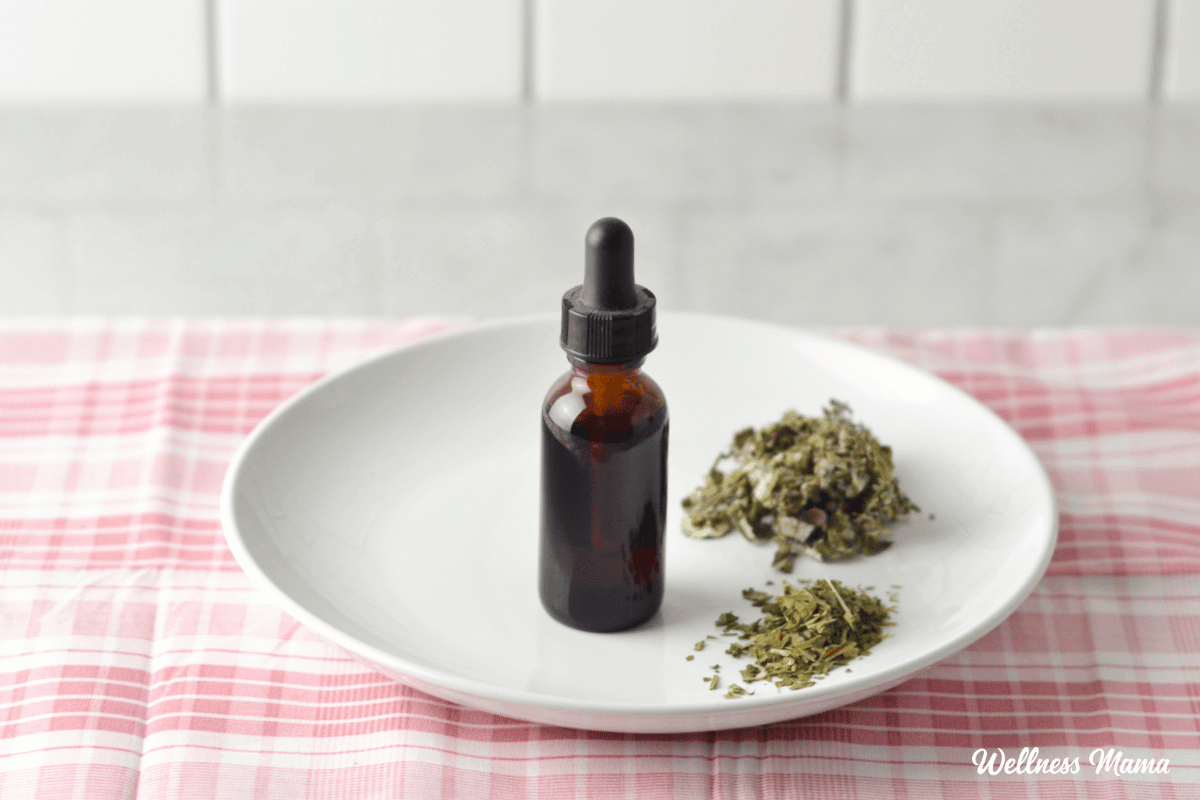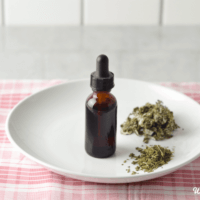I shared my homemade chewable vitamins for kids (or adults) in the past. While that’s definitely the crowd favorite at our house, I also wanted to share my herbal liquid multivitamin tincture.
This recipe is basically an herbal glycerite made with certain high-nutrient herbs to create a liquid multi-vitamin. It can easily be customized and can be for children or adults.
Making an herbal multivitamin tincture is the same process used to make any herbal glycerite, but these specific herbs are a natural source of nutrients and make an excellent vitamin. While the overall nutritional amounts are lower, they are highly bioavailable.
Why A Liquid Vitamin?
My kids love the chewable/gummy vitamins, which are also a great source of gelatin. However, this tincture has a higher concentration of some vitamins and minerals from the herbs. Plus, it’s more concentrated, so you don’t have to take as much. You only need a tiny amount of this tincture to get a good dose of vitamins/minerals. This makes it useful during illness or when it’s hard to keep food down (early pregnancy, etc).
It’s much easier to make supplements a regular part of your daily routine when they’re easier to take!
Homemade herbal multivitamins are also an inexpensive way to get necessary vitamins and minerals without the additives and fillers often found in commercial vitamins. Since the minerals come from natural plant sources (the herbs), they’re more likely to be in balance than synthetic versions. And their natural synergism helps increase absorption.
If made correctly, herbal multivitamin tinctures taste great and are an easy way to get little ones to take vitamins! I also use vitamin tinctures like this during pregnancy and breastfeeding for nutrients and to keep my immune system balanced.
Multivitamin Tincture Herbs
Before using any herbs be sure to research and only use herbs that are safe to use long term. I’ve shared my recipe below, but you’ll have to determine which herbs are best for your family before making one. In the past, this recipe had an alcohol option to make a true tincture, but vitamins and minerals don’t extract as well into alcohol. By using glycerin, the recipe still avoids synthetic preservatives, is shelf-stable, and is a better source of certain nutrients.
Making an Herbal Vitamin Glycerite
Glycerin is popular in some groups because of its sweet taste. It’s also an alcohol free way to preserve herbs for those who want to avoid alcohol. Even though it’s sweet, it’s not a sugar and won’t raise insulin levels for most. It’s also very popular with kids!
Alcohol tinctures are a little stronger than glycerites so you do have to take a higher dosage with glycerites. However, glycerin does a better job of extracting water-soluble vitamins, aromatics, and other constituents. You won’t really be getting fat-soluble vitamins like vitamin D, E, A, and K.
The herbs I use in my recipe are:
I chose these specific herbs for a reason…
Alfalfa
Alfalfa is often called “nature’s multivitamin” for its high concentration of many vitamins and minerals. Most notably, it contains eight essential amino acids, vitamin K, and has the highest chlorophyll content of any plant. This is also why I use it in my pregnancy tea. An herbal glycerite made with alfalfa has vitamins B and C, some calcium, iron, magnesium, phosphorus, and potassium.
Red Raspberry Leaf
This is one of my favorite herbs, and I took it during the latter half of my pregnancies. It has B-vitamins and vitamin C, as well as calcium, magnesium, manganese, potassium, and phosphorus. Raspberry leaf is a favorite for pregnant women for its ability to tone the uterus and make labor easier. I wonder if this is due in part to its magnesium content since magnesium was extremely helpful to me during pregnancy.
Dandelion Leaf
Also very high in vitamins and minerals, especially calcium. It’s the same type of dandelion that grows rampant in your backyard, and its root, leaves, and even flowers are very useful! Dandelion root is said to be great for the digestive system and gut health, liver, pancreas, gall bladder, and circulatory system.
Dandelion leaf not only has calcium, but you’ll also find vitamin B, potassium, and iron. It’s often used as a diuretic to flush excess waste from the body and support the kidneys (without depleting potassium).
Stevia
I use stevia simply for taste, but it does have its own health benefits. This herb is optional though if you don’t have any or want to skip it. Stevia is rich in phenols, flavonoids, vitamins, and minerals. It also has antioxidant, antimicrobial, and anti-inflammatory properties. You’ll also find folic acid, micronutrients, essential amino acids, calcium, potassium, iron, and vitamin C.
I’ve also included peppermint leaf in the past for the kids, but prefer not to use large amounts of this during pregnancy or in very small children. I usually leave the mint out of the multivitamin tincture. Nettle leaf is another common option for multivitamin tinctures. Similar to alfalfa, it’s very high in nutrients.
How to Make A Liquid Multivitamin Tincture
This liquid multivitamin uses vegetable glycerin to extract the nutrients, so it’s technically an herbal glycerite. You can see step-by-step directions for how I make glycerites in this post. The following method uses a sealed simmer extract. The heat helps to extract the plant constituents and using a lidded jar prevents volatile plant oils from evaporating.
For our herbal multivitamin, I use:
- 3 parts Alfalfa
- 2 parts Red Raspberry Leaf
- 2 parts Dandelion Leaf
- 1 part Stevia (optional)
- non-GMO food grade glycerin
I mix in whatever quantity needed, usually 1 part=1/4 cup, or by weight 1 part=1 ounce.
You can scale the recipe up or down depending on how much you want to make. The recipe below makes enough for 1 pint jar. Double it if you want to make it in a quart jar. Keep in mind that you’ll get about 1.5 cups of liquid total if making it in a pint jar. The exact amount depends on how much liquid your herbs absorb and how thoroughly you squeeze them afterward.
I usually fill the jar 1/3 to 1/2 full of dried herbs and don’t pack them down.
Herbal Multivitamin Tincture
Equipment
- Pint size mason jar with lid (double the recipe if using a quart jar)
- Crock Pot (or pot)
Materials
- ⅓ cup alfalfa leaf
- ¼ cup red raspberry leaf
- ¼ cup dandelion leaf
- 2 TBSP dried stevia leaf (optional)
- 1 cup glycerin
- ¾ cup filtered water (or distilled water)
Instructions
- Add the dried herbs to your jar. Pour in the glycerin and water and stir to combine.
- Wipe the jar rim and put the lid on.
- Place a wash cloth or silicon baking mat (to keep jar from breaking) in the bottom of a crock pot with a “keep warm” or very low setting. Fill the crock pot up with water to cover 3/4 of the jar (don’t cover the lid!) and turn on the lowest setting.
- Keep in the slow-cooker for at least 1 day on this setting, adding water as needed. I’ve done up to three days.
- If you prefer to use the stovetop, then place a wash cloth in the bottom of a pot and place the jar on top. Fill the pot so the water covers about 3/4 of the jar. I use a pot that’s deep enough for me to do this and also put the pot lid on. Simmer gently for 2-3 hours.
- Once the mixture is cool, use a cheesecloth to strain out the herbs. Squeeze the cloth to get out as much liquid as possible.
- Store the glycerite in a clean dropper bottle or jar.
Notes
- When made and stored properly, glycerites have a shelf life of 2-3 years.
How Much to Take?
I take 1 teaspoon up to three times a day as needed (or 1 tablespoon in the morning). Kids usually get 1/2 to 1 teaspoon per day.
Other Options
When I haven’t had the time or supplies to make a tincture, I’ve also used the same herbal combination to make a basic infusion instead. Or I’ll add the dried herbs to smoothies.
To make an infusion, I pour 1/2 gallon of boiling water over 1 cup of the herb mixture, cover, and steep overnight. For smoothies, I add 1 tablespoon of the dried herb powder to smoothies. Herbal infusions extract vitamins better than a glycerite, but they aren’t as shelf-stable or concentrated!
Pregnancy
If you’re pregnant or may become pregnant, this multivitamin tincture isn’t enough because there are some extra nutrients and trace minerals mothers need. Here are the prenatal supplements I used during pregnancy. You can also try this nourishing pregnancy tea recipe.
Ever made herbal vitamins? What did you use? Share below!






Leave a Reply